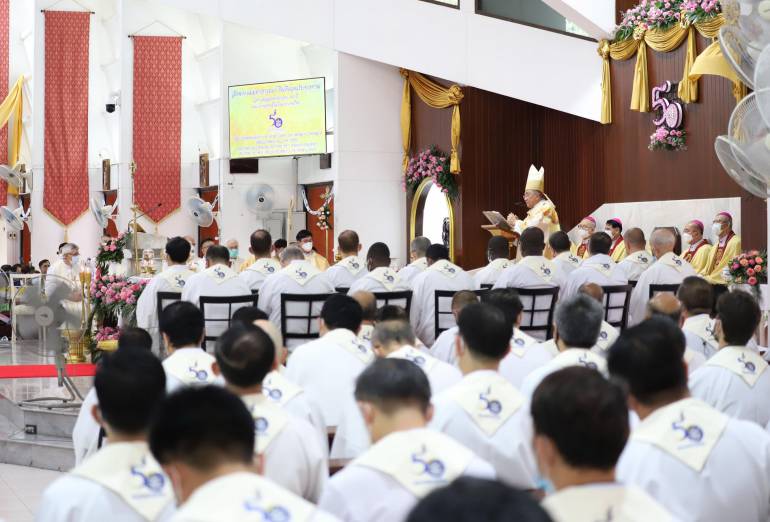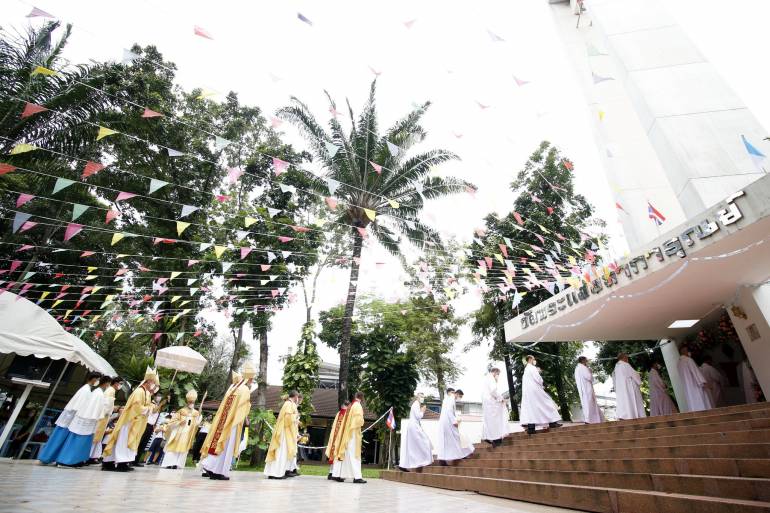Pontifical Institute for Foreign Missions celebrates five decades of service in Thailand

The Pontifical Institute for Foreign Missions (PIME) celebrated the 50th anniversary of its presence in Thailand on September 10.
The Archbishop of Bangkok, Cardinal Francis Xavier Kriengsak Kovitvanit, presided over the thanksgiving Mass at Our Lady of Mercy Parish in Nonthaburi, a suburb of Bangkok, together with other Thai bishops, the superior general of the Institute, Father Ferruccio Brambillasca, two representatives from the Apostolic Nunciature in Thailand, and many religious priests and sisters from various congregations.
PIME has always been at the cutting edge of evangelization in Thailand.
PIME is a society of apostolic life, a community of priests, brothers, and lay people who proclaim the Gospel and work at the "peripheries" of the world. Their activities are cutting edge in the mission of the Church.
Founded in 1850, PIME has sent almost 2,000 missionaries around the world. At present, its 400 members work in 19 countries.
As of 2022, 13 missionaries are working in Thailand, both in the Archdiocese of Bangkok and in the Diocese of Chiang.
The PIME missionaries arrived in Thailand after being expelled from Myanmar in 1972, and their pastoral experience in Myanmar helped them to get deeply involved with the tribal people in Northern Thailand.
The Second Vatican Council (1962–1965) also inspired them, urging the little community to proclaim the Gospel in new ways. That’s why they started a challenging but lasting dialogue with Buddhism in Thailand.
Portuguese missionaries brought Christianity to Thailand in the early 16th century, but the religion did not take hold among Thais.
Christians, who include both Catholics and Protestants, account for more than 1% of the country's 69 million people. As Thailand's largest religious minority, Muslims constitute more than 4% of the population and are concentrated in the south.
Nowadays, the PIME missionary strategy in Thailand is still to announce the Good News to the poor and, at the same time, give them hope through social work.
At Our Lady of Mercy Parish in Nonthaburi, Italian priest Adriano Pelosin of PIME and head of the Thai Missionary Society said a foundation with the intent of helping the orphans and abandoned kids he met during his work in the Bangkok slums area.
"I could not bear to see so many children roaming around the shanties along the canals. They did not have enough food to eat; no education, or anyone who cared for them. I had to do something for them," he said.
He opened a shelter in the slum first and asked some mothers of goodwill he trusted to take care of them, but this was not the ideal solution for the kids. So, he found a bigger place, and that’s how the "Home for Hope" was started.
Massimo Bolgan now looks after 85 children at Home for Hope.
Father Pelosin is also the Superior General of the Thai Missionary Society (TMS), a group of diocesan priests that dedicate part of their lives to the mission "ad gentes" (to the nations).
"TMS reminds the local clergy that the church has a missionary vocation; all its members are called to proclaim the Gospel," he added.
In his homily, Bangkok Cardinal Kovitvanit praised the PIME missionaries for their reliable testimony and said, "Our vocation is to be missionary disciples."
As a result of receiving the Holy Spirit, besides the fact of feeling like one family, the mission of the Apostles to preach the Good News began. Their unity and their dedication received the "power" from the Holy Spirit.
Their personal lives and their unity as a Christian family made the Good News they preached "reliable". But being "salt of the earth and light of the world is not easy," said the cardinal.
"We need to look at the life of the Virgin Mary. Her close relationship with the suffering of Christ contributed to human salvation because she voluntarily accepted the will of God, including the afflictions," said the prelate.
Cardinal Kovitvanit also believes that being a witness is serving the poor. That’s why he entrusted PIME, a pilot parish in a slum area of the Archdiocese of Bangkok.
"We," he said, "in the Bangkok Archdiocese, are very grateful for PIME's presence and collaboration in the mission of our local church and we ask them to continue this fruitful pastoral collaboration."

In these 50 years of mission in Thailand, there have been different generations of missionaries and young priests are now on the front line of missionary work.
Italian Father Daniele Mazza, in his forties, works in the field of interreligious dialogue, and he believes that this commitment is a special vocation.
"When, 10 years ago, PIME’s superior general asked us to be creative and find new ways of evangelization as the Holy Spirit inspired us at the beginning of our journey in Thailand," said Mazza.
"I gave my availability and I asked to study at the International College of Buddhist Studies in Ayutthaya to be able to continue interreligious dialogue with competence," he said. "For me, it was like a new calling, able to give a new direction to my missionary vocation."
Father Mazza is preparing his doctoral dissertation and, at the same time, he is also the assistant director of the office for inter-religious dialogue and ecumenism of the Archdiocese of Bangkok.
On June 17, he brought around 100 people—Buddhist monks and laypeople from two Buddhist monasteries—to meet Pope Francis in Rome.
In November, PIME will celebrate the 50th anniversary of their presence in Thailand once again in Chiang Rai, a mountainous province in northern Thailand, with the hill tribe people they have been serving for so many years.
The youth they welcome in their hostels, the students they send to school, the people they visit, and for whom they celebrate the sacraments in the remote areas of northern Thailand, will gather in Chiang Rai, and together they will thank the Lord for the gift of faith. - Domenico Rodighiero
Radio Veritas Asia (RVA), a media platform of the Catholic Church, aims to share Christ. RVA started in 1969 as a continental Catholic radio station to serve Asian countries in their respective local language, thus earning the tag “the Voice of Asian Christianity.” Responding to the emerging context, RVA embraced media platforms to connect with the global Asian audience via its 21 language websites and various social media platforms.














